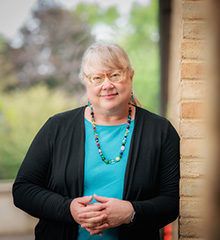As I sit down to write this, the biblical passage that resides in my ears from liturgy today is “the seed that falls on good ground will yield a fruitful harvest.” (Isaiah 55, Psalm 65)
How many times have I wondered why God’s church is declining, and so much of the world is hurting? I work with hundreds of seminary students every year who are preparing to go out into the world and preach Good News. And at the same time, I hear from former students who are out there right now, doing this, and doing it in powerful, compelling, loving ways. Yet all around me fewer and fewer people have hope. The statistics are damning, and I won’t repeat them here, but loneliness, isolation, disconnection, and trauma are all on the rise even as we live into an ever more digitally networked world.
Where is the good news here?
“The seed that falls on good ground will yield a fruitful harvest.”
How am I supposed to believe that? What does it mean to participate in tilling the soil, in seeking to prepare for God’s word being planted deep within, when we can’t even make church budgets work? Let alone public schools, public health, and public safety function? And the earth is heating up beyond our ability to mitigate it? It is so hard to look directly at these challenges, and yet doing so – walking through the lament and the brokenness – can bring new hope. We need to ask, where is the good ground?
Hope arises when we can perceive the patterns that are fragmenting and fracturing us, and begin to weave different patterns. I haven’t been able to think of an enterprise that is shared, and that seeks a common good, a common purpose, that is not scrambling to find a way to survive on its own right now. A few examples:
- Churches are seeking to make their budgets work.
- Schools are seeking funding levees.
- Healthcare systems are merging into ever larger behemoths because they can’t sustain their previous levels of profit.
- Criminal justice systems are falling apart as the privatization of prisons grinds all participants – prisoners, corrections officers, state bureaucracies – into dust.
These are patterns that are emerging in every landscape. We need clear lament – and then we need to re-member – to perceive that recognizing a pattern is a step towards changing it. We do not do this alone, and we should not be trying to do it by ourselves.
We are at the dawn of a new age in so very many ways. Activist, lawyer, seminary-trained philosopher Valarie Kaur invites us to imagine that rather than the “darkness of a tomb” perhaps this time is a “darkness of a womb” – and we are laboring to give birth. How might we find hope in the midst of it? How might we perceive the “signs of the times” in ways that lead to hope rather than despair? How do we breathe in the midst of this labor?
One place I believe we have to start, woven directly into the fabric of creation, is to believe, and to act on the belief, that “we do better when we all do better” (to quote Paul Wellstone). As Chris Benner and Manual Pastor write in Solidarity Economics: Why Mutuality and Movements Matter, “for nearly 250 years now our major economic and political institutions have been built on the assumption of self-interested individuals and the continued systematic marginalization of disenfranchised groups.” But that is not the heart of the gospel, nor is it the framework that lives in the Hebrew bible.
We do not have to live this lie. We can, instead, plant in the soil of creation, in the good ground with which God has gifted us, evidence of our shared life. We can live from a deep sense of interconnection and interdependence.
I’ve written about universal basic income (UBI) as one project within a broader market-based economy, to lift each other up and create more room for pragmatic action that brings hope. Here I want to share something of the larger global discussion in which UBI is but one example, and that discussion goes by the name of “solidarity economics.”
There are people all over the world who are tending “good ground” by asking questions of our current economic structures. We are wondering whether competition and greed are the only mechanisms at work, and whether there are other stories to be told, stories that put solidarity and mutuality at the heart of our lives together. Maybe you’ve heard the Greek word “oikonomia” at some point in your life of faith? This is a very ancient word that has roots in what it means to steward wisely. It’s a word that asks us to pay attention to what we do in our daily lives together in our homes.
Solidarity economics is rooted in “oikonomia” — in both a belief in and evidence of how compassion and cooperation make for more effective, efficient, and enduring economic action.
At the heart of our biblical understanding, at the heart of the covenant God made with us, is a deep care for each other in this “oikonomia.” We worship a relational God, a God who in God’s very being is in relationship – three persons, Creator, Savior, Holy Spirit – and in that relationship God’s being pours out into all of Creation. Can we give ourselves room to believe this? Not simply on Sunday mornings, or in the privileges afforded to the ever smaller number of people who live on top of an unequal society, but every day and for all of us?
Solidarity Economics In Practice
Solidarity economics lives in projects such as co-ops, in crowd-based funding, in fair trade initiatives, in alternative forms of currency (barter, trade, and so on), and yes, in myriad basic income pilots taking place all over the world. And these stories are so powerful and energizing!
Let your curiosity take you into the web, or even into ChatGPT and do a search for “solidarity economics.” You’ll find the work of Chris Benner and Manual Pastor (in both scholarly and comic book form), who are leading research across the country about a “third way” to do economics. You’ll find Joerg Rieger, a theologian at Vanderbilt Divinity School whose work on “theology in the capitalocene” offers biblical and theological grounding for a way to organize our economic lives that promotes collaboration and cooperation, as well as limits to inequality, a way that research suggests is even more effective than the competitive, selfish stories that have driven our markets for the last few centuries.
Rather than arguing for capitalism or for socialism, we can argue for a third way, a way of sharing our stories that is grounded in the holy ground of knowing that we are deeply interdependent. We belong to each other, and in doing so we are created by God to care for each other. As challenging and complex and fragmented as the world might appear to be through the lens of individualism, a different lens – one which highlights mutuality, compassion, and solidarity – lights up ways in which market-based structures that preference these dynamics can be more effective than those that are built on assumptions of self-interest and competition.
So – how do I start?
To help you get started, share stories of solidarity economics with your congregation to bring awareness of these projects that lift up mutual aid, and embody restoring and repairing, rather than punishment and further harm. Here are links to some stories to help you get started.
- Faith-based groups who use their space to provide intergenerational child and elder care.
- A church who runs a farm
- The multi-faith city network that offers technical support for religious organizations that want to get high speed broadband functioning in co-operative ways.
- A Detroit, MI church that offers affordable housing, employment services, medical care, free internet for the community, and even a marching band
And isn’t this what the Gospel is all about? Preaching the gospel in a way that draws on these examples of compassion and solidarity makes it real in this world, and further tills the ground that becomes good soil.
“The seed that falls on good ground will yield a fruitful harvest.”

